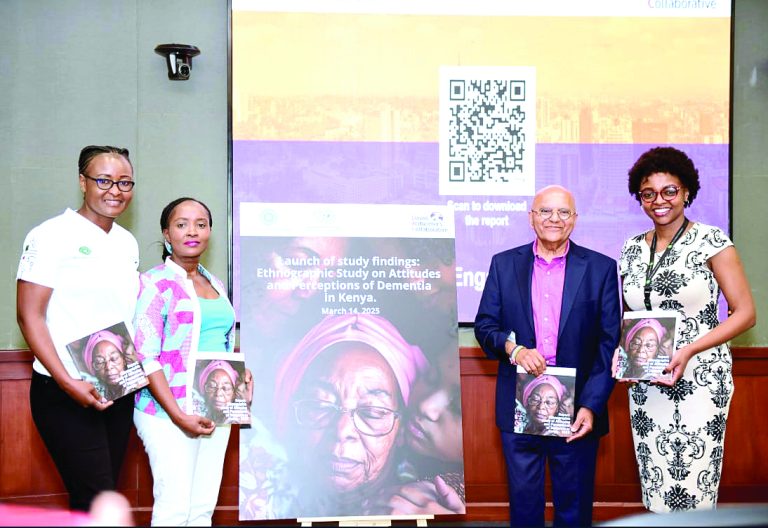Experts call for urgent reforms as dementia cases in Kenya rise

Dementia, including Alzheimer’s, is rapidly emerging as a health crisis in sub-Saharan Africa which consists of low and middle-income countries.
Globally, over 50 million people live with Alzheimer’s and related dementias, and by 2050 projections estimate that 150 million people will suffer the same.
In Africa, cases of dementia are poised to surge from three million cases in 2020 to over eight million in 2050.
Kenya in particular is at a greater risk, with approximately 258,000 older adults living with dementia as of 2019, and the numbers projected to have doubled over the years.
Despite this risk, there is limited information about dementia and it remains misunderstood and overlooked.
As such, dementia remains a silent struggle that many families grapple with, thinking it is just one of the side effects of ageing.
As a result, limited awareness and prevalent misconceptions hinder effective diagnosis, care, and treatment.
“Dementia is a social, economic, and healthcare crisis that will only intensify if ignored. Right now, too many families are left to navigate this journey alone, struggling with stigma, financial strain, and a healthcare system that is not prepared to support them,” said Dr Bosire, a Medical Anthropologist at BMI.
In response to this, the Aga Khan University of Brain and Mind Health Institute (BMI) in collaboration with Davos Alzheimer’s Collaborative (DAC) conducted a study examining attitudes, perceptions, and experiences of dementia in Kenya, led by Dr Bosire.
The report revealed that Dementia awareness remains critically low among patients and their caregivers and many patients seek medical care only when symptoms have significantly worsened.
Spiritual causes
More notably, behaviours associated with dementia have been attributed to traditional beliefs and stigma surrounding dementia which contribute to delays in seeking medical care, with some individuals even attributing symptoms to spiritual causes.
“Awareness of dementia in informal settlements is minimal, leading to misinformation and stigma,” read the report.
Due to these perceptions, the report revealed that trust in medical research still remains low.
When it comes to health care, the report found that most primary healthcare providers
lack training in dementia diagnosis and management, leading to missed or late diagnoses.
“Caregivers, primarily female family members, lack the knowledge or training and resources needed for effective dementia management,” it further indicated.
Further, the high cost of dementia care, particularly in private hospitals, is a major barrier for many families whereas Healthcare providers noted a lack of coordinated dementia care pathways, leaving many patients and caregivers uncertain about the next steps.
“Caregivers sacrifice their time, health, and livelihoods to care for loved ones with dementia, and our research shows that they feel isolated and overwhelmed, lacking even the most basic information about how to support a person living with dementia, shared Dr Bosire.
She pointed out that many caregivers do not know where to go for help and those who do often find that healthcare facilities are not equipped to provide specialized dementia care.
Ultimately, the report revealed that the lack of dementia policy guidelines is an impediment to dementia care and management in Kenya.
She is now calling on the urgent need to prioritize caregiver support, healthcare provider training, and public education on dementia.
“We must empower caregivers, train healthcare workers, and recognize dementia as a national priority,” insists Dr Bosire.
Following the disturbing findings, the report recommended various propositions to tackle dementia which included establishing a national dementia policy framework that provides clear guidelines for dementia care, diagnosis, and management within Kenya’s healthcare system.
Additionally, it proposed making dementia care affordable and accessible, strengthening healthcare infrastructure, and ensuring community awareness and public education.
Enhancing research participation and transparency, supporting caregiver initiatives, and government and institutional collaborations were also highlighted as potential solutions that could help reduce dementia cases.
“By implementing targeted policy actions, Kenya can improve early detection, provide better support for caregivers, and foster a dementia-friendly society. As the aging population continues to rise, it is crucial to act now to address the growing dementia burden and ensure that affected individuals receive the care and dignity they deserve,” recommended the Dr Bosire-led team consisting of Dr Zul Merali and Dr Chi Udeh-Momoh of the BMI among others.











